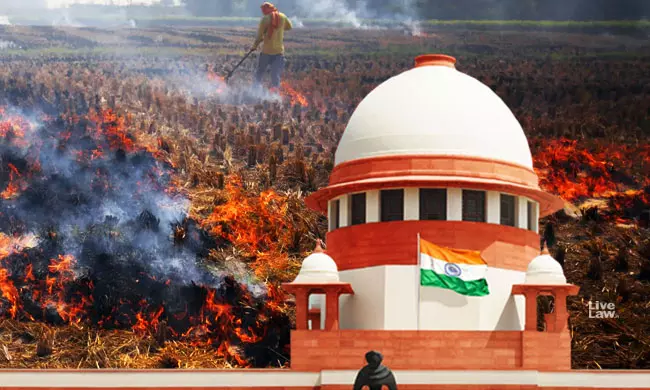
Image Source: livelaw
The issue of stubble burning in North India has been a major environmental concern for years, contributing significantly to air pollution, particularly during the winter months. In a significant move, the Supreme Court of India has directed Punjab and its neighboring states to put an end to the practice of stubble burning. This directive is not only vital from an environmental standpoint but also holds significant relevance from the perspective of the Union Public Service Commission (UPSC) examination as it deals with several important issues such as air quality, sustainable agriculture, and the role of the judiciary in environmental matters.
Background
Stubble burning is the practice of setting crop residues on fire after harvesting. This has been a traditional method for farmers to quickly clear their fields for the next sowing season. However, it results in the release of harmful pollutants and greenhouse gases into the atmosphere, causing severe air pollution in the Indo-Gangetic plain, especially in states like Punjab, Haryana, and Uttar Pradesh. The pollution levels in Delhi, the national capital, often reach hazardous levels due to this practice, leading to a public health crisis.
UPSC Relevance
The Supreme Court's directive to stop stubble burning is relevant for UPSC aspirants in various ways:
- Environment and Ecology: Understanding the impact of stubble burning on air quality and the environment is essential for UPSC exams, especially for those appearing for the Civil Services Examination. The adverse effects of such practices are an important aspect of the environment and ecology syllabus.
- Agriculture and Sustainable Practices: The issue of stubble burning also pertains to sustainable agricultural practices. UPSC often explores topics related to agriculture and the need for sustainable methods, considering the increasing challenges of climate change and environmental degradation.
- Judicial Activism and Environmental Protection: The Supreme Court's role in addressing environmental issues through judicial activism is a significant topic for UPSC aspirants. The directive to curb stubble burning showcases the judiciary's proactive approach in safeguarding the environment and public health.
Environmental Impact
Stubble burning releases pollutants such as particulate matter, carbon monoxide, sulfur dioxide, and nitrogen oxides into the atmosphere. These pollutants are harmful to human health and contribute to various respiratory and cardiovascular diseases. Additionally, the carbon released during burning contributes to global warming and climate change. Thus, the directive to stop stubble burning is crucial for mitigating air pollution and addressing climate change issues.
Way Forward
To address the issue effectively, the Supreme Court has directed states to provide financial incentives and machinery to farmers to encourage alternative methods of managing crop residues, such as mulching and in-situ crop residue management. This approach not only promotes sustainable agriculture but also provides a viable solution to the problem of stubble burning.
In conclusion, the Supreme Court's directive to halt stubble burning in Punjab and neighboring states is a significant step toward environmental protection and public health. It underscores the importance of sustainable agriculture, environmental conservation, and the judiciary's role in safeguarding the environment. Aspiring UPSC candidates should be aware of such developments as they are crucial for understanding the contemporary issues and challenges that the nation faces.